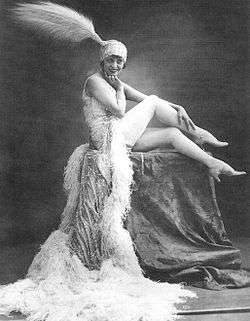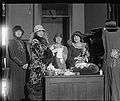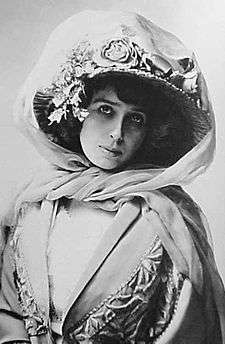Mistinguett
| Mistinguett | |
|---|---|
|
Mistinguett by Paul Nadar (son of Nadar) | |
| Born |
Jeanne Florentine Bourgeois 3 April 1875 Enghien-les-Bains, Île-de-France, France |
| Died |
5 January 1956 (aged 80) Bougival, Île-de-France, France |

Mistinguett (French: [mistɛ̃ɡɛt]; 3 April 1875 – 5 January 1956) was a French actress and singer, whose birth name was Jeanne Florentine Bourgeois. She was at one time the highest-paid female entertainer in the world.[1]
Biography
The daughter of Antoine Bourgeois, a 31-year-old day-laborer, and Jeannette Debrée, a 21-year-old seamstress, Jeanne Bourgeois was born at 5 Rue du Chemin-de-Fer (today Rue Gaston-Israël), in Enghien-les-Bains, Val-d'Oise, Île-de-France, France. The family moved to Soisy-sous-Montmorency where she spent her childhood; her parents later worked as mattress-makers.[2][3]
At an early age Bourgeois aspired to be an entertainer. She began as a flower seller in a restaurant in her hometown, singing popular ballads as she sold blossoms. After taking classes in theatre and singing, she began her career as an entertainer in 1885. One day on the train to Paris for a violin lesson, she met Saint-Marcel, who directed the revue at the Casino de Paris. He engaged her first as a stage-hand, and here she began to pursue her goal to become an entertainer, experimenting with various stage-names, being successively Miss Helyett, Miss Tinguette, Mistinguette and, finally, Mistinguett.[4]
Bourgeois made her debut as Mistinguett at the Casino de Paris in 1895 and went on to appear in venues such as the Folies Bergère, Moulin Rouge and Eldorado. Her risqué routines captivated Paris, and she went on to become the most popular French entertainer of her time and the highest paid female entertainer in the world, known for her flamboyance and a zest for the theatrical.[1] In 1919 her legs were insured for 500,000 francs.
Though Mistinguett never married, she had a son, Léopoldo João de Lima e Silva, by Brazilian diplomat Leopoldo de Lima e Silva (died 1931); the latter was a grandson of the Duke of Caxias.[3] She also had a long relationship with Maurice Chevalier, 13 years her junior. It is claimed that she and Chevalier informed the police in 1940 that singer/songwriter Charles Trenet was gay and consorting with youths.[5]
She first recorded her signature song, "Mon Homme", in 1916. It was popularised under its English title "My Man" by Fanny Brice and has become a standard in the repertoire of numerous pop and jazz singers.
During a tour of the United States, Mistinguett was asked by Time magazine to explain her popularity. Her answer was, "It is a kind of magnetism. I say 'Come closer' and draw them to me."
Death
Mistinguett died in Bougival, France, at the age of 80, attended by her son, a doctor.[3][6] She is buried in the Cimetière Enghien-les-Bains, Île-de-France, France.
Upon her death, writer Jean Cocteau observed in an obituary, "Her voice, slightly off-key, was that of the Parisian street hawkers—the husky, trailing voice of the Paris people. She was of the animal race that owes nothing to intellectualism. She incarnated herself. She flattered a French patriotism that was not shameful. It is normal now that she should crumble, like the other caryatids of that great and marvelous epoch that was ours".[3]
Gallery
 Mistinguett poster, 1911
Mistinguett poster, 1911 Mistinguett in the United States in 1924
Mistinguett in the United States in 1924 Poster "Mistinguett Moulin Rouge", by Charles Gesmar, 1926
Poster "Mistinguett Moulin Rouge", by Charles Gesmar, 1926 Mistinguett and Josephine Baker in 1927
Mistinguett and Josephine Baker in 1927 Mistinguett in her Chrysler, Deauville, France, 1929
Mistinguett in her Chrysler, Deauville, France, 1929
Filmography
- Carosello del varietà (1955)
- Paris 1900 (1947)
- Rigolboche (1936) .... Lina Bourget
- Island of Love (1929)
- Mistinguett détective II (1917)
- Mistinguett détective (1917)
- Flower of Paris (1916) .... Margot Panard et Mistinguett
- Sous la menace (1916)
- The Gold Chignon (1916)
- Doppia ferita, La (1915)
- Valse renversante, La (1914)
- Misérables – Époque 4: Cosette et Marius, Les (1913) .... Éponine
- Misérables – Époque 3: Cosette, Les (1913) .... Éponine
- Misérables – Époque 2: Fantine, Les (1913) .... Éponine Thénardier
- Misérables – Époque 1: Jean Valjean, Les (1913) .... Éponine Thénardier
- Glu, La (1913) .... Fernande, dite 'La Glu'
- Une bougie récalcitrante (1912)
- Parapluie, Le (1912)
- Vocation de Lolo, La (1912)
- À bas les hommes (1912)
- Bal costumé (1912)
- Coup de foudre, Le (1912)
- Folle de Penmarch, La (1912) .... Yvonne ... aka Folle de Pen-March, La (France)
- Moche, La (1912)
- L'Oubliée, L (1912)
- Un enfant terrible (1912)
- Clown et le pacha, Le (1911)
- Épouvante, L' (1911) .... La star de music-hall ... aka Terror-Stricken (UK)
- Ruse de Miss Plumcake, La (1911) .... Miss Plumcake
- Timidités de Rigadin, Les (1910) .... La fiancée de Rigadin
- Ce bon docteur (1909)
- L'Enlèvement de Mademoiselle Biffin (1909)
- Un mari qui l'échappe belle (1909)
- Fiancée récalcitrante, La (1909)
- Fleur de pavé (1909)
- L'Empreinte ou La main rouge (1908)
References
- 1 2 Du Noyer, Paul (2003). The Illustrated Encyclopedia of Music (1st ed.). Fulham, London: Flame Tree Publishing. p. 420. ISBN 1-904041-96-5.
- ↑ Town of Soisy sous Montmorency, "History of Soisy"
- 1 2 3 4 Flanner, Janet, Paris Journal, Volume Two, 1956—1964 (Harcourt Brace Jovanovich, 1965), page 6
- ↑ Regine Reyne (2008) The Eye Behind the Scenes; My Years in the Music-Halls of Paris, Editions Harmattan, Paris ISBN 978-2-296-06435-5
- ↑ Maurice Chevalier: The Authorized Biography, by David Bret, 2002, pg 113 ISBN 1-86105-499-8
- ↑ In addition to her son she was survived by two grandchildren, Francisco de Lima e Silva (also a diplomat) and Maria Helena de Lima e Silva.
Paris Journal was written by Janet Flanner, Paris writer for the New Yorker, 1925-1975.
External links
| Wikimedia Commons has media related to Mistinguett. |
| Wikiquote has quotations related to: Mistinguett |
- Mistinguett at the Internet Movie Database
- Fan Site at the Wayback Machine (archived 28 October 2009)
- Mistinguett by Lenci, c.1924
- Photographs and literature
